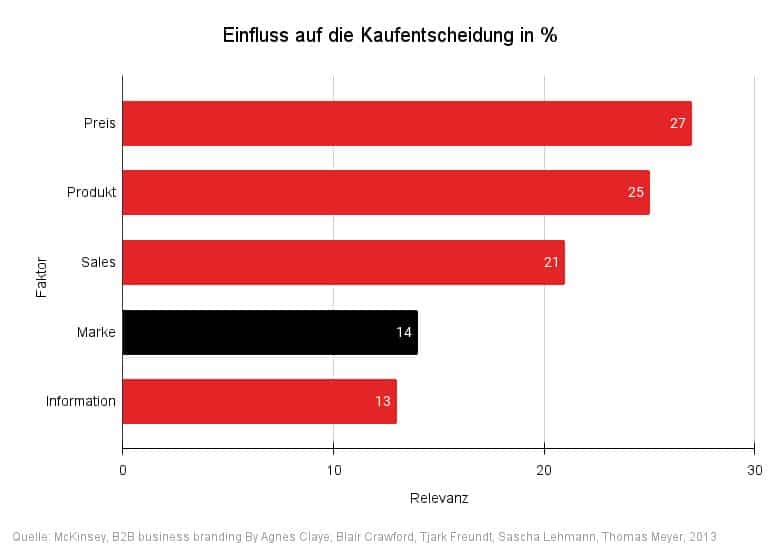Branding is not only important for B2C companies. In the complex ecosystem of the B2B marketing a well thought-out brand strategy can make all the difference. In this article, we take a comprehensive look at the mechanisms and benefits of an effective brand.
What is B2B branding anyway?
Attention is a rare commodity these days, so a clear brand presence is essential. In the B2B sector, however, branding is not only about visual elements like Logos or colour schemes - it is the overall perception a customer has of your company. This perception is a complex web of experiences, interactions and expectations that go far beyond the product offering.
A key element of this branding is the successful planning and implementation of brand strategies. It is essential to dive deep into the psyche of customers to identify their true needs and expectations. Only by understanding the customer's perspective can companies develop a branding strategy that both meets their own business objectives and adds real value for their customers.
"A brand is the set of expectations, memories, stories and relationships that together lead consumers to choose one product or service over another."
- Seth Godin, US entrepreneur and marketing author
Why is branding important in B2B?
In the B2B world, the sales process is often lengthy and multi-layered, with multiple decision makers and numerous interactions taking place before a deal is closed. Buyers here, especially with complex products or services, need reliable and in-depth information at all stages of the purchase. While consumers perceive brands mainly as carriers of image and emotion, business customers value other brand functions, such as risk reduction and information economy, more highly.
This is where the "art of selling without selling" comes into play. Through strategic creativity and clear brand differentiation, you can create such a strong position in the market and in the mind of the customer that the deal can often be considered won even before the actual sales process. A strong brand serves as a filter and orientation aid, reduces the complexity of decision-making and creates a feeling of security.
A well-designed B2B brand strategy is a long-term investment in customer trust and loyalty. It makes your business more robust in the face of unexpected challenges and creates a special relationship that does not depend on a single salesperson or project.

Practical tips for effective B2B branding
- Strategic creativity: It combines creative thinking with business purpose. Take, for example, a B2B company that sells specialised machines: Instead of just presenting an impressive 3D model of a machine, explanatory videos and customer reviews are integrated directly into the model. Customers can thus better understand the functions and make purchase decisions more quickly. Here, creativity is not just on display, but serves a clear business purpose: accelerated sales.
- Brand differentiation: The more saturated the market, the more important it is to stand out from the competition. Whether that's product features, customer service or special offers - your brand communicates the difference to others and why your solution is unique!
- Deliver convincing messages: Communicate clear and convincing brand messages. Especially in the daily flood of information from emails, social media and online posts, it must be quick and clear to grasp why a message is interesting for recipients. Show that you have understood the needs of your customers and let your brand speak.
- Consistency shows effect: Effective branding is not a one-off event, but an ongoing process. Consistency in brand communication across different channels and touchpoints is crucial to build trust and credibility.
This applies to visual consistency (logos, colour schemes, fonts, etc.), consistency in brand messaging across all communication channels, as well as emotional consistency - direct experiences every time you interact with your brand. - Customer satisfaction through experience: In B2B, customer satisfaction is not only the result of a good product or service offering, but above all the result of the entire experience customers have with your brand. This includes all interactions, from the first contact to after-sales service. Satisfied customers will not only remain loyal, but also act as brand ambassadors. So invest in training your team, building strong customer relationships and constantly improving your processes to ensure a consistently positive customer experience.
- Stakeholder engagement: In the B2B sector, there are often several decision-makers involved in the buying process. It is therefore crucial to identify and target all relevant stakeholders. This can range from technical experts to buyers to business managers. Understand the individual needs and requirements of each stakeholder and tailor your communication accordingly. Use regular feedback rounds and build long-term relationships.
- Future-oriented brand interactionsStay proactive in brand marketing. Inform customers in advance about industry trends and new offers. Use training and digital tools such as AI chatbots or mobile apps to be perceived as an industry leader and strengthen your brand. Every initiative pays into the value of your brand.
"" STAY UP-TO-DATE WITH OUR NEWSLETTER""
Online branding in the B2B sector
Today, digital branding goes far beyond a mere online presence. The goal is to establish an authentic and valuable brand in the digital space.
Digital platforms like websites, social media and email marketing are more than just communication channels. They are strategic tools that B2B marketers can use to reach stakeholders more effectively and deepen relationships. With the right content strategy, combined with data-driven insights, marketers can significantly increase customer engagement and conversion.
The targeted Use of Display advertising and Search engine marketing not only increases visibility and reach, but also strengthens the perception and positioning of the brand in the digital environment. This is also about relevance. Through targeted retargeting and precise targeting, B2B marketers can maximise the ROI of their campaigns while intensifying brand loyalty.
High quality content are the heart of online branding in B2B. Content such as white papers, case studies or webinars should not only inform, but also reflect the brand values and expertise of the company. It is crucial that this content meets the needs of the target group and offers real added value.
Here, Zühlke relies on webinars, for example, to reach new target groups and strengthen its digital brand.
The role of storytelling in B2B branding
Good stories stick. Through Storytelling you can translate complex products or services into simple, comprehensible concepts. This creates an emotional resonance that strengthens the bond with the customer and increases brand loyalty.
Talent magnet through strong corporate brand marketing
A strong brand attracts not only customers but also talent. This is especially important for B2B companies, which are often considered "hidden champions" in their industry, but are unknown outside their niche. A strong brand conveys the whole picture and shows what a company does, produces or sells. And it shows what values and philosophies are behind a company.
Successful Employer branding significantly improves HR recruiting. Since a company is thus already clearly positioned in the minds of customers and stakeholders, the mere mention of the brand evokes all available associations with it.
Current trends in B2B branding
The world of marketing is constantly changing, and B2B branding is no exception. Here are some current trends that are shaping B2B branding:
- Sustainability and social responsibility: More and more B2B companies are referring to sustainability initiatives and social responsibility in their brand communication, as customers are increasingly placing value on this.
- Personalisation: With advanced data analytics tools, companies can better tailor their brand communications to individual customers or customer segments. This leads to more relevant and effective marketing messages.
- Digital experiences: In today's digital era, customers expect seamless digital experiences. This ranges from user-friendly websites and interactive webinars to virtual reality (VR) and augmented reality (AR) applications that present products and services in an immersive environment.
- Thought Leadership: B2B companies are increasingly investing in content that demonstrates their expertise in a particular area. This can be in the form of white papers, studies, webinars or podcasts.
- Human connection in the digital world: Despite the focus on digital, B2B customers are looking for authentic human connections. Brand messages that emphasise authenticity, empathy and human stories are more appealing to the target audience.
Download B2B Marketing Trends free of charge
A fine summary with all the info you need to know now on the topic of trends, tendencies, tips and misconceptions in B2B marketing. Here you will find the current trends in B2B marketing for download.
The ROI of a strong B2B brand
A well-designed B2B brand strategy can deliver both "hard ROI" in the form of increased sales and "soft ROI" through increased customer loyalty and brand awareness.
In today's data-driven world, it is essential to make the success of your brand strategy quantifiable. This is where Key Performance Indicators (KPIs) come into play, which are much more than just buzzwords. They are crucial tools that can measure the ROI of your branding efforts.
- Net Promoter Score (NPS): It measures the willingness of customers to recommend your company to others. A high NPS is often an indicator of strong customer loyalty and thus of a successful branding strategy. It can also give you an indication of which aspects of your brand are particularly well received and where there is room for improvement.
- Customer Lifetime Value (CLV): CLV indicates the value a customer places on your company over the course of their entire business relationship. A high CLV indicates strong brand loyalty and can serve as an indicator of the long-term success of your brand strategy.
These KPIs allow you to calculate the value of a B2B brand, strengthen it through targeted measures and refine your corporate branding strategies.
The psychology behind B2B branding
There are many misconceptions about B2B branding. Some believe that B2B buyers would make purely rational decisions and that branding is therefore irrelevant. However, experience and research show that emotional factors about 21 % of the decision making processespecially if the functional aspects of an offer are similar.
So it makes sense to integrate these psychological aspects into your B2B brand management. Not only do they offer the opportunity to stand out from the competition, but they can also have a significant impact on the longevity and success of your business relationships.
The following Cognitive biases and psychological factors play just as important a role in the B2B sector as in the B2C sector:
- Anchor effect: This is a cognitive bias where people rely too heavily on the first piece of information they receive (the 'anchor') when making decisions. For example, if a customer has a positive first experience with your brand, that experience will serve as the anchor for all future interactions. This means that the likelihood of a decision in favour of your brand will be higher for the customer's future purchases, even if objectively equivalent or even better alternatives are available.
- Emotional connection and loyalty: People are emotional beings, and this is also true for B2B buyers. A strong brand can create an emotional connection with your customers that goes far beyond the purely functional aspects of the product or service. This emotional connection is often the key to customer loyalty and can be a decisive competitive advantage.
- Beyond rational considerations: Even if buyers in B2B have a list of requirements and criteria they consider when choosing a product or service provider, the psychological and emotional aspects are often the deciding factors. This is because the emotional component simplifies the decision-making process and strengthens the feeling of security and trust in the chosen brand.
Pitfalls and how to avoid them
Inconsistency is the enemy of any strong brand. Clear and consistent brand communication across all channels and touchpoints is critical to building and maintaining customer trust.
Brand as an instrument: It is a common misconception to think of the brand as merely a visual symbol, such as a logo or colour scheme. In reality, the brand represents the entire experience a customer has with a company - from product quality to customer service to corporate culture. Companies that recognise their brand as a central tool can create a coherent and consistent brand experience across all touchpoints.

Digital transformation in B2B branding: In the digital era, the way brands are perceived and experienced is subject to constant change. The digital transformation not only influences business processes, but also brand identity and communication. In B2B, this means that brands need to communicate their messages and values clearly and consistently through digital channels. In this context, it is crucial that employees understand and live the digital brand strategy.
A strong digital brand presence can help build trust, deepen customer relationships and stand out from the competition in a competitive market environment. It's about transferring the traditional brand identity into the digital world while being flexible to market changes.
Best practice in B2B branding: Forbes Marshall
Forbes Marshall, a leader in process efficiency and energy conservation, did not focus on visual elements alone when building its brand. Rather, the company emphasises deep customer relationships and an understanding of its customers' processes and operational gaps.
Through targeted integrated marketing communications (IMC), the company has established itself as a strong B2B brand. Forbes Marshall uses a variety of IMC tools, including brochures, an informative website, newsletters, personal visits, advertisements in trade magazines and participation in exhibitions and seminars organised by renowned business groups. These tools serve to convey a consistent brand message.
Forbes Marshall's branding goes beyond just offering products and focuses on building trust and customer satisfaction. Customer satisfaction is achieved through various measures, such as offering customised solutions, meeting delivery times and specifications, providing quality products and quick availability of spare parts.
A particular focus is on the continuous training of the sales and technical team to ensure that customer needs are always at the centre. Forbes Marshall impressively demonstrates how B2B branding can be successfully implemented through a combination of effective IMC tools and a strong focus on customer satisfaction.
Conclusion: The advantage of a strong brand
Branding in business-to-business embodies the overall experience and perception a customer has of a company and significantly influences purchasing decisions and customer loyalty. Effective B2B brand management takes into account both rational and emotional aspects and builds on trust, consistency and added value for the customer.
Companies like Forbes Marshall demonstrate how integrated marketing communications and a customer-centric approach can create an impactful brand presence in the B2B space.
Why is branding important now? A strong B2B brand is often an "invisible advantage", but it has a huge impact on business success. It provides orientation and sets your company apart from the competition. Strategic and consistent branding should therefore be used as a key tool for long-term success and growth.








